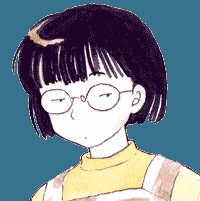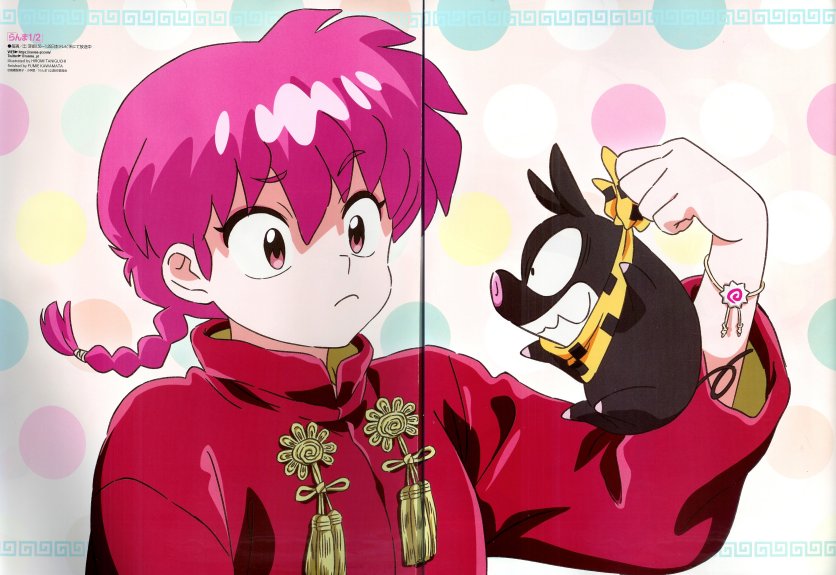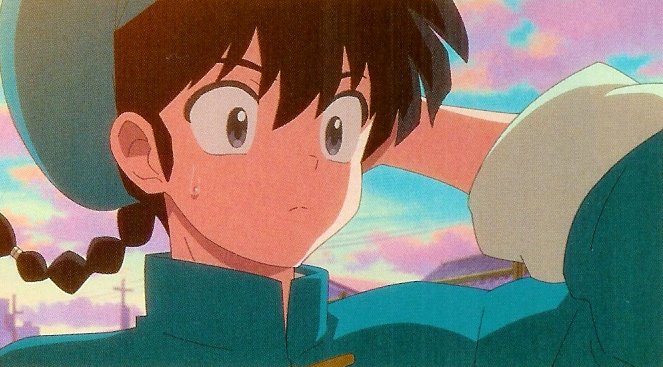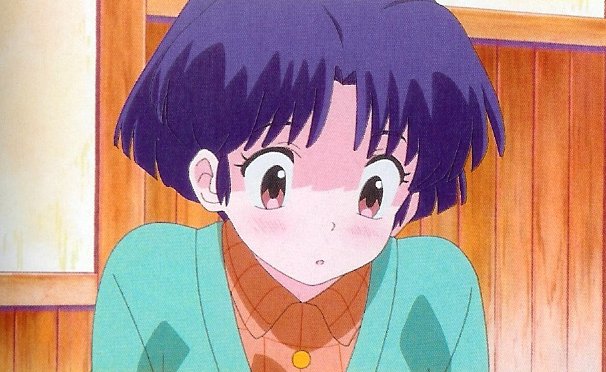

A Crazy Symphony
Translation by: Anime News Network and Harley Acres
"We have Ranma, of the Saotome School of Anything-Goes Martial Arts, and Akane, a student of the Tendo Dojo. The two are engaged to be married by their parents. But Ranma has a problem... he turns into a girl when splashed with water." (from the opening credits)....And so, the newly begun Reiwa-era Ranma 1/2 has entered the pair skating arc. The curtain has been raised on the skating match, with P-chan, who Azusa Shiratori has taken a liking to and arbitrarily named Charlotte, at stake. P-chan's true identity is Ryoga, Ranma's rival. Ryoga, like Ranma, has a unique curse that causes him to change form when splashed with water.
The pair of Ranma and Akane are cornered by the powerful technique "The Goodbye Whirl" by the pair of Mikado Sanzenin and Azusa Shiratori. Then Ryoga appears, having reverted to his human form, and teams up with Ranma, who has turned female, to challenge Sanzenin and Azusa once again. During the fight, the ice on the rink breaks into pieces and turns into drifting icebergs. If Ryoga falls into the water, his identity as P-chan will be revealed. Furthermore, Sanzenin's evil hand is aimed at Akane's lips. The battle that cannot be lost begins once again...
Comedy, battle, and romantic comedy. The music for Ranma 1/2, which changes expression all the time, was composed by veteran Kaoru Wada, known for the music for Inuyasha and other works. What kind of approach did Wada take to the music that colored Ranma 1/2?

The Melody to Accompany a Perfect Moment
Interview - Musician Kaoru Wada

How did you feel when you were asked to work on Ranma?
Wada: I had worked on Inuyasha for a long time and have a close relationship with the original author, Rumiko Takahashi-sensei, on both a personal and professional level, so I was both nervous and excited. Actually, Kenji Kawai-san, who did the music for the previous Ranma 1/2 anime, is also a friend of mine, so we were like, "I wonder how this will play out" (laughs). [1] But the biggest thing for me was that Director (Konosuke) Uda chose me for this project, so first and foremost, I wanted to take part and meet his expectations. [2]What sort of order did Director Uda give you?
Wada: I had worked with Uda before on certain episodes of titles like Gegege no Kitaro (ゲゲゲの鬼太郎) (Season 4) and The Kindaichi Case Files (金田一少年の事件簿/Kindaichi Shonen no Jikenbo), but this was my first time working with him as series director. He told me, "I want you to make a song with a melody." Most recent Hollywood productions have scores made to evoke a certain situation or atmosphere rather than focus on a specific melody, but that wasn't what he wanted. So, when composing each track and its variations, I continuously used the melody.The world of Ranma incorporates a lot of Chinese style.
Wada: Yes, that's right. I often incorporate instruments from various cultures in my works, so naturally this time I used a variety of traditional Chinese instruments. The erhu (two-stringed bowed instrument) is my go-to, and then I also use the dizi (Chinese flute), the Chinese biwa, Chinese zithers such as the guqin and yangqin, and percussion instruments like the xiaoluo (small gong). My usual music is orchestral, but since Ranma is a more contemporary setting…or I suppose it's set in the '80s, but at any rate, I wanted to incorporate synth instruments together with traditional Chinese ones to establish a unique world.Since this series is a comedy, there are many bridges (short interludes that play after comedic scenes or to indicate a punchline, etc.)
Wada: Director Uda and I are close in age, so I think we have a pretty similar grasp on comedy. Specifically, I think we are both more familiar with the comedy of the Showa era (1926-1989) than that of today (laughs). It's been some time since I composed so many bridges, but they were really commonly used in anime up until the '90s. In recent times, a music director might cut out a part of the main theme to use for a bridge, but this time, I wanted to compose with the nostalgia of the old days. Jokes are meant to be short and snappy, so I wrote the bridges to also be short and fast-paced for easy insertion.It felt like many of the songs had a variety of percussion instruments in them to evoke a specific feeling.
Wada: Anime remakes can be difficult in a lot of ways. In that regard, since I actually know Kawai-san personally, I was able to consider, "if it were Kawai-san, he would probably have taken this approach..." and then from there, consider how I would do it. I think the increase of rhythmic music was a result of that. ...Also, I actually composed the music for this project quite in advance.You did?
Wada: So at the time I was composing, I actually had very little material from the anime, and really only had the original manga to go off of. Of course, I discussed everything with Director Uda and gave valuable input such as what direction he wanted to go with for Ranma, and such. But it was all still just in his head at that point (laughs). So, I composed the soundtrack mainly by simulating how I thought it should sound while rereading the original manga. It was definitely an interesting experience.The appeal of Rumiko Takahashi's works is the unique characters.

Looking at the music menu, there are orders such as, “a very Chinese feel” or "Chinese acrobatic troupe." [3]
Wada: Actually, those two were added by me. The one with a very Chinese feel, for example, could be used when the Chinese Amazon Village appears. The acrobatic troupe one is lively and upbeat, as you might expect. This time around, there are a lot of scenes with design-like, artistic backgrounds, so I wanted to make tracks that could correspond to those parts that weren't in the previous anime and, therefore, evoke a new and original impression of Ranma.How did the recording go?
Wada: I pretty much always use an orchestra as a base for my compositions, so the process is typically the same, but this time, we had many Chinese instruments and 60 songs, so it was quite a busy recording. But everyone knew each other already, so it all proceeded smoothly. For example, the erhu player, Chen Min-san, joined us. Erhu, when played by a Chinese musician, has a very unique style, so we asked her to play it a bit more robustly this time. There aren't a ton of anime that are set in China, however there are quite a few games, so there are a good deal of Chinese musicians working in Japan.Would you say that 60 is a lot for an OST?
Wada: Yes, I'd say so. However, I think Director Uda actually narrowed down his order. That is to say, the guest characters in each episode of Ranma all have their strong quirks–or rather, very fun and colorful personalities. So you can't help wanting to give each new character in every episode their own theme song (laughs). Realistically, however, that is very difficult to pull off, so we managed to narrow it down to 60 tracks in the end.What would you say was the most difficult piece of music that you composed for this project?
Wada: That would have to be Ranma's theme. I wrote and rewrote it many times. It has an intro, which then leads into the main melody, but I wanted the intro to be usable as a track on its own and also to be able to forgo the intro and start playing straight from the main melody. Not to mention the melody needed to be catchy as per Director Uda's request. So I would write a little, try listening back to it as an objective observer, and think, “Hmm, that's still not quite right,” rewriting it many times over.Director Uda placed his trust in me and gave me a lot of creative freedom, which was a lot of pressure, so I was very critical of myself while composing it.
How did it feel to see the anime with sound?
Wada: Director Uda comes from Toei Animation, so he does his own sound direction. [4] He's developed his own style, and I think he has a really good sense for applying music. He's like, "Let's start the music here," sandwiches in some action, and ends the scene with a bang. That's why I was immediately relieved when I first saw the dubbing. I had delivered the music to him already and gotten his approval, but there are some things you just can't know until you've synced it up to the animation, so when I saw the dubbing, I felt I could finally rest easy.Wada-san, what do you find appealing or characteristic when it comes to Rumiko Takahashi's works?
Wada: The main thing for me would have to be her unique characters. Whether it's the main characters or supporting cast, everyone has such strong characteristics to the point that they practically upstage one another. And not just on the surface, but also in the way each character is depicted in incredible detail. The way these characters all interact with one another as their stories unfold is what is so appealing in her works.The diversity of her characters is certainly appealing.
Wada: Also, the perfect "pauses" add so much fun to her stories and only make them that much more interesting. I'm sure the staff probably had some struggles in translating these pauses from the manga into the anime adaptation. For me, I think the music can actually help with that. That was my feeling going into this project.
Ranma's Theme
"I imagined him as a boy who is a martial artist and can perfom action scenes, but who is also simple and mischievious. I felt that energy was the most important thing, and I also incorpoated various Chinese tastes. I composed the melody to be thick and memorable. I also created many vaiations using this basic melody." (Wada)
Akane's Theme
"Akane has two sides to her: he strong side as a martial artist, and her cute, fairy-tale-like side. It's difficult to make these two sides coexist in one song, so I composed each side separately. However, the matial artist side is not the main focus of this work, so I wrote it with Akane, who cares about Ranma, in mind." (Wada)
Ranma and Akane's Theme
"I wrote seven versions in total, and I think this is the song with the most variations. The main focus of the story is the relationship between the two characters, so from their first meeting, there are twists and turns that I think are nice, but then they end up fighting... I thought about how I could express all sorts of emotions, and the vaiety increased." (Wada)
Battle Theme
"The diffence between the battles in Inuyasha and Ranma is the range. In Ranma, there is serious action and there is playful action, and the atmosphere also changes depending on the character you're fighting, so we needed that much variety." (Wada)
Bungo Stray Dogs x The Kindaichi Case Files
Anime Delievered by Orchestra
The anime orchestra series is conducted and planned by Kaoru Wada and the theme of volume 2, which will be held in March and April 2025 is "suspense". A special concert where Bungo Stray Dogs and The Kindaichi Case Files will bring to life a dream feast! Also in May, an orchestral concert titled "Inuyasha x Yashahime: Princess Half-Demon ~To the Future~" will be held. Be sure to check this out too!
Anime Ochestra Series Vol. 2
Orchestra vs Suspense
Bungo Stray Dogs x The Kindaichi Case Files
March 29, 2025, Tokyo Opera City Concert Hall
April 5, 2025, Fenice Sakai Large Hall
Web: https://ppt.or.jp/concerts
Web: https://jco.orr.jp/concert/8880
Footnotes
- [1] Kaoru Wada (和田薫) was responsible for all of of the music on Inuyasha, Inuyasha: The Final Act and Yashahime: Princess Half-Demon as well as all four of the Inuyasha films. Kenji Kawai (川井憲次) worked on the soundtrack for Maison Ikkoku, Ranma 1/2 and the Mermaid Forest OVA. He has gone on to be director Mamoru Oshii's (押井守) most recurring musical collaborator with work on Ghost in the Shell (攻殻機動隊/Kokaku Kidotai) and Mobile Police Patlabor (機動警察パトレイバー/Kido Keisatsu Patoreiba). An interview with Kawai about this wok on Maison Ikkoku can be read here.
- [2] We have inteviews with Konosuke Uda available here and here.
- [3] The music menu (音楽メニュー/ongaku menyuu) is a list of directions from the director or sound director describing how they would like certain scenes scored. This is mentioned often in the "Maison Ikkoku Music Box" interviews.
- [4] As indicated here, that is not always the case at some studios. At Kitty Animation, where Urusei Yatsura, Maison Ikkoku and Ranma 1/2 were made in the 1980s Shigeharu Shiba (斯波重治) served as the sound director on all three of those projects. Interviews with him can be found here and here.

月刊ニュータイプ January 2025
|